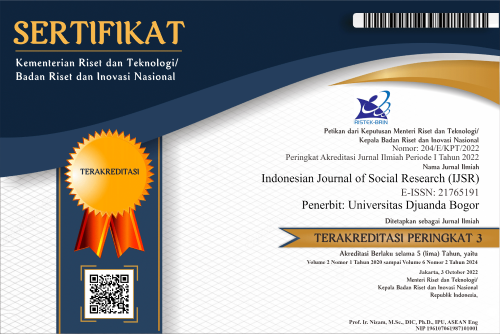Tax Compliance: Sanction and Awareness Perspective of Motor and Car Owners in Indonesia
Abstract
The low awareness of motor vehicle taxpayers in Indonesia is in contrast to the motor vehicle tax revenue in the Bogor regency, which always exceeds the target. This study aims to reveal this phenomenon by involving the awareness variable and tax sanctions on taxpayer compliance. This study uses quantitative methods to 400 motor vehicle taxpayers. Research shows that tax awareness and sanctions have a significant effect on taxpayer compliance. This research has also succeeded in revealing that the determination of the target of motor vehicle tax revenue in the Bogor regency is appropriate.
References
Alasfour, F. (2019). Costs of distrust: The virtuous cycle of tax compliance in Jordan. Journal of Business Ethics, 155(1), 243–258.
Alm, J. (2019). What motivates tax compliance? Journal of Economic Surveys, 33(2), 353–388.
Batrancea, L., Nichita, A., Olsen, J., Kogler, C., Kirchler, E., Hoelzl, E., Weiss, A., Torgler, B., Fooken, J., & Fuller, J. (2019). Trust and power as determinants of tax compliance across 44 nations. Journal of Economic Psychology, 74, 102191.
Bruno, R. L. (2019). Tax enforcement, tax compliance and tax morale in transition economies: A theoretical model. European Journal of Political Economy, 56, 193–211.
Casais, B., Ferreira, M. R., & Proença, J. F. (2019). Social Marketing for the Reduction of Tax Evasion: The Case of Electronic Invoicing in Portugal. In Social Marketing in Action (pp. 175–186). Springer.
Dobos, P., & Takács-György, K. (2020). The impact of the relationship between the state, state institutions and tax payers on willingness to pay tax. Serbian Journal of Management, 15(1), 69–80.
Enachescu, J., Olsen, J., Kogler, C., Zeelenberg, M., Breugelmans, S. M., & Kirchler, E. (2019). The role of emotions in tax compliance behavior: A mixed-methods approach. Journal of Economic Psychology, 74, 102194.
Güzel, S. A., Özer, G., & Özcan, M. (2019). The effect of the variables of tax justice perception and trust in government on tax compliance: The case of Turkey. Journal of Behavioral and Experimental Economics, 78, 80–86.
Harju, J., Kosonen, T., & Slemrod, J. (2020). Missing miles: Evasion responses to car taxes. Journal of Public Economics, 181, 104108.
Hoy, C., McKenzie, L., & Sinning, M. (2020). Improving tax compliance without increasing revenue: Evidence from population-wide randomized controlled trials in Papua New Guinea. Tax and Transfer Policy Institute, Working Paper, 7.
LaMothe, E., & Bobek, D. (2020). Are Individuals More Willing to Lie to a Computer or a Human? Evidence from a Tax Compliance Setting. Journal of Business Ethics, 1–24.
Nagel, H., Huber, L. R., Van Praag, M., & Goslinga, S. (2019). The effect of a tax training program on tax compliance and business outcomes of starting entrepreneurs: Evidence from a field experiment. Journal of Business Venturing, 34(2), 261–283.
Noersanti, L., & Susanti, E. H. (2019). The Impact of Modern Tax System Against Transport Workers Taxpayer Compliance Online. 5th Annual International Conference on Accounting Research (AICAR 2018).
Rosid, A., Evans, C., & Tran-Nam, B. (2019). Perceptions of Corruption and Tax Non-Compliance Behaviour: Policy Implications for Developing Countries. Available at SSRN 3317994.
Slemrod, J. (2019). Tax compliance and enforcement. Journal of Economic Literature, 57(4), 904–954.
Zhang, L., Smith, E., & Gouldman, A. (2020). The Effects of Individual Values on Willingness to Pay and Fairness Perceptions of Use Tax on Internet Purchases. In Advances in Taxation. Emerald Publishing Limited.
Copyright (c) 2020 Indonesian Journal of Social Research (IJSR)

This work is licensed under a Creative Commons Attribution-ShareAlike 4.0 International License.
The Authors submitting a manuscript do so on the understanding that if accepted for publication, copyright publishing of the article shall be assigned/transferred to Indonesian Journal of Social Research (IJSR) Universitas Djuanda as Publisher of the journal. Upon acceptance of an article, authors will be asked to complete a 'Copyright Transfer Agreement'. An e-mail will be sent to the corresponding author confirming receipt of the manuscript together with a 'Copyright Transfer Agreement' form by online version of this agreement.
Indonesian Journal of Social Research (IJSR) Universitas Djuanda, the Editors and the Editorial Board make every effort to ensure that no wrong or misleading data, opinions or statements be published in the journal. In any way, the contents of the articles and advertisements published in the Indonesian Journal of Social Research (IJSR) Universitas Djuanda are sole and exclusive responsibility of their respective authors and advertisers.
Remember, even though we ask for a transfer of copyright, our journal authors retain (or are granted back) significant scholarly rights as mention before.
The Copyright Transfer Agreement (CTA) Form can be downloaded here: Copyright Transfer Agreement-IJSR 2020
The copyright form should be signed electronically and send to the Editorial Office e-mail below:
Dr. Rasmitadila, M.Pd (Editor-in-Chief)
Universitas Djuanda
Jl. Tol Jagorawi No.1, Ciawi, Kec. Ciawi, Bogor, Jawa Barat 16720
Website: http://journal.unida.ac.id/index.php/IJSR/index
Email: ijsr@unida.ac.id





4.png)



